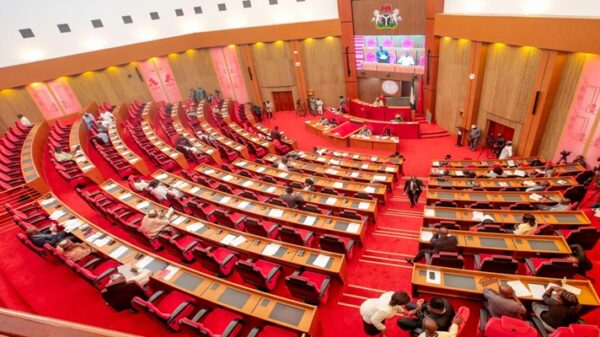Prof. Umar Garba Danbatta, Executive Vice Chairman of the Nigerian Communications Commission (NCC), has said leveraging the potential of Information and Communication Technology (ICT) to automate service delivery should be the next frontier of excellent service delivery to Nigerians by public institutions.
Danbatta made the assertion in a goodwill message presented on his behalf by NCC’s Director, Public Affairs, Dr. Ikechukwu Adinde, at the opening ceremony of a three-day SERVICOM retreat, which started on December 1, 2021 at the Communications and Digital Economy Complex, Mbora, Abuja.
The retreat focused on, ‘Charter Performance Monitoring and Reporting’, was aimed at monitoring the implementation of the NCC’s Client Service Charter, identifying gaps, measuring and evaluating the progress of service delivery in the Commission.
SERVICOM, an acronym derived from Service Compact with all Nigerians, speaks to a special social contract between the Federal Government through its institutions (Ministries, Department and Agencies) and the Nigerian people that ensures services are delivered in a courteous, prompt and efficient manner.
Speaking at the event, attended by staff of NCC, Adinde said the NCC has been living up to its expectation as one of the public institution that has continued to implement the Service Charter with all its various stakeholders. The Director Public Affairs stated that the digital economy drive of the Federal Government should mean that more services be delivered online to the people of Nigeria and in a more efficient manner in line with the philosophy of SERVICOM.
He said the NCC is an important partner of SERVICOM in its journey towards service delivery and excellence, and invited the participants to recall that fact in the passion and commitment of Prof. Danbatta in ensuring that telecom service providers deliver optimal service to varied categories of stakeholders.
“Therefore, from our perspective as regulator of the digital ecosystem in Nigeria, we feel that automation of service should be the next stage of service delivery. While we have started this journey with the example of REMITA, which has brought about a lot of efficiency and transparency into the payment remittances by public and Ministries, Department and Agencies (MDAs) of government,” Adinde stated.
On the implementation of the NCC Charter for SERVICOM, Adinde said the NCC boasts of one of the best and brightest brains that could be found in the public sector as civil servants, who are ingrained with good work ethics and culture. “Our staff are renowned for their warmth and geniality when dealing with internal and external stakeholders.
“They work as a team on the principle of achieving Specific Measurable, Achievable, Realistic, and Time-bound (SMART) objectives of the Commission,” he said.
Adinde also listed the roles of the Commission in collaborating with other MDAs in various ways, in order to achieve policy objectives of government in many fronts. He also highlighted a number of corporate social responsivity (CSR) projects of the Commission being implemented singly or jointly with other MDAs towards achieving the objective of government to serve the citizenry better.
As a further demonstration of the duty NCC owes telecoms consumers, whose interest must be protected in line with Nigerian Communications Act (NCA), 2003, Adinde said NCC created the Consumer Affairs Bureau in September 2001, to ensure consumer protection through policy development and monitoring, advocacy, as well as information and education of all shades of stakeholders.
“Consequently, NCC is one of the few MDAs that has a dedicated toll-free number, designed specifically for the escalation of issues between telecommunications service providers and consumers. We also constantly monitor the Quality of Service (QoS), ensuring that service delivery issues are within the acceptable key performance indicators (KPIs),” Adinde said.
Meanwhile, the National Coordinator/Chief Executive Officer of SERVICOM, Nnena Akajemili, in her remark at the event, commended NCC for contributing to the cultivation of effective communication between the Commission and its various stakeholders for improved service delivery.
Akajemili acknowledged the commitment of NCC towards facilitating major activities, even as she affirmed that the Commission had improved significantly in delivering its key regulatory functions.
Akajemili also observed that NCC went the extra mile in engaging its stakeholders as well as creating affinity between itself and its stakeholders.
Akajemili stated that she was particularly gratified by NCC’s contribution of 11.94 per cent to the nation’s Gross Domestic Product (GDP), based on the National Bureau of Statistics (NBS) report for the third quarter of 2021.
However, the SERVICOM Chief Executive beseeched the Commission sustain and expand on its collaboration with other Ministries, Departments and Agencies (MDAs) specifically in the area of data management, CSR, Value Added Services (VAS) and short codes, to enhance greater synergy among MDAs.
Head, Legislative and Government Relations, NCC and SERVICOM Nodal Officer at the Commission, Bashir Bello, said SERVICOM, as a service delivery initiative, requires everyone to put in his or her best in achieving desired objectives.
He emphasized the role of Management’s support, education, and commitment towards improving and consolidating the various SERVICOM interventions that had been initiated.
The event was attended by SERVICOM Team leads, departmental liaisons officers in the NCC, SERVICOM rapporteurs, and other staff of the Commission.
L: R Bashir Bello, Head, Legislative and Government Relations, Nigerian Communications Commission (NCC); Dr. Ikechukwu Adinde, Director, Public Affairs, NCC; Nnenna Akajemeli National Coordinator, Service Compact (SERVICOM); Ngozi Akinbodewa, Team Lead D, SERVICOM, and Clement Dogara, Head of Curriculum, SERVICOM Institute.
![]()


























































